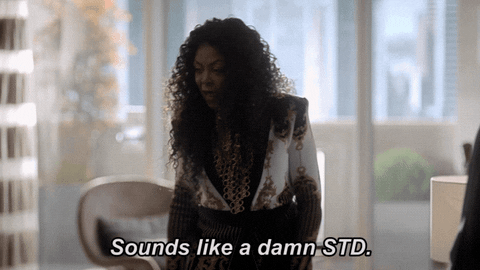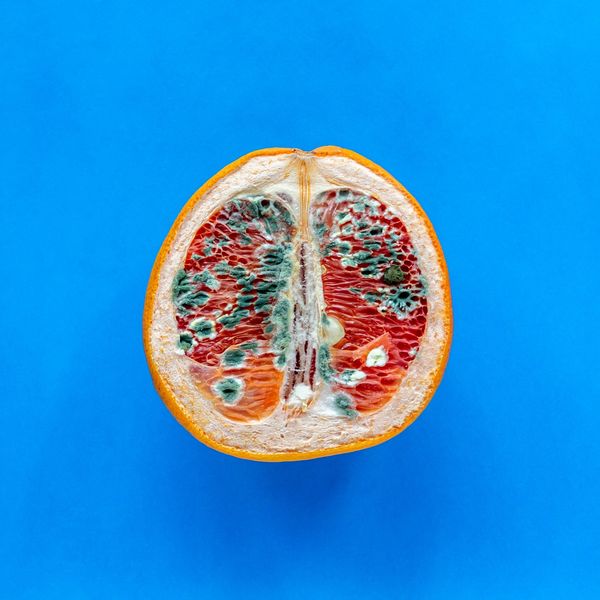When it comes to a year like this one (has it been a year, a decade or a century? It's hard to tell at this point), you've gotta do your best to look for the silver linings. For me, one of them has been learning how to implement even better boundaries while also learning how to be extremely proactive about staying as stress-free as possible. What's a trip about that second point is, when you really decide to get still and "tune in" to your mind, body and spirit, it can be a plum trip what is revealed.
Take our vaginas, for example. In the midst of all that's happening in your life right now, have you ever wondered how "she's" doing. How she's really doing? If, in the midst of everything, if she might be feeling a little stress, strain and/or anxiety too? If the thought hasn't really crossed your mind, but now that I asked, you're like, "How would I know if my vagina is stressed, sis?", I'm so glad that you asked. Take a moment, breathe in deeply (exhale deeply too) and check out some very telling indicators that your vagina might actually be stressed out AF right about now.
Are You Getting More Yeast Infections?

I don't know about y'all, but I honestly can't think of too many things that are worse than a yeast infection. The incessant itching alone is enough to literally make you feel like you're losing your damn mind! So, where exactly do they come from? Our vaginas naturally produce a certain amount of bacteria and yeast. But when either of those is thrown out of balance, the yeast (also known as candida) can grow out of control, and—bam! An infection is oftentimes the result.
As far as what triggers the overgrowth—medications (including birth control), pregnancy, hormonal levels being thrown out of wack, diabetes, sex (if your natural bacteria doesn't initially "gel" with your partner's), and a compromised immune system. Three things that can weaken your immunity are sickness, too much sugar, and yes, stress. So, if a yeast infection has popped up as of late and you can't attribute it to any of the other causes that I shared, it very well could be a clear sign that you need to get your stress under control.
Stress remedy: One of the main ways to prevent a yeast infection that is triggered by stress is to up your probiotic intake and lower the amount of sugar that you consume. The probiotics (make sure that the brand you get has lactobacillus acidophilus, lactobacillus rhamnosus and lactobacillus reuteri in it; they're all good for vaginal health) are great because they will help to keep "good bacteria" in your gut and vagina. Less sugar is good because sugar is an enemy of your immunity; the less you consume, the healthier your body—including your vagina—will ultimately be.
Are Your Periods All Over the Place?

Something that I'm thankful for is the fact that my period is pretty regular. But something that I've noticed is if I've had a particularly stress-filled month, sometimes my cycle is thrown off by a few days. Although everything from birth control and pregnancy to thyroid issues, fibroids, hormonal shifts, excessive exercise, and endometriosis can all cause your period to be semi-unpredictable, if you can typically set your watch (or app) by yours but the past couple of months, that hasn't exactly been the case, think back to how anxious, worried or stressed you've been. Believe it or not, when we're stressed out, that can affect the part of our brain that alerts our body to where our period should actually start. So, if yours seems to be shorter or longer than usual, don't underestimate that stress could most definitely be the cause.
Stress remedy: The main thing to keep in mind if your period is fluctuating due to stress is you need to get your cortisol levels down. You can do this by meditating, participating in yoga, drinking ginger tea (especially a week prior to when you expect your cycle to start), and taking a multivitamin. As far as vitamins go, make sure yours has a good dose of Vitamin D in it because studies show that a Vitamin D deficiency actually plays a role in irregular cycles.
Are Period Cramps Suddenly Totally Off of the Charts?

When it's time for our period to start, a chemical known as prostaglandins sends a signal to our uterus, letting it know that it's time to contract so that the lining of our uterus can shed (by the way, did you know that slightly upping your dose of ibuprofen, the moment your period starts, can actually delay it by a day or two? You can read more about that here). Pretty much all of us have some level of discomfort during this process (especially on day one); but if you basically are in so much pain that you're out for the count for the first 48 hours or so, you may have what is known as dysmenorrhea, which is just another word for a painful cycle. But what if you only feel this way, during your period, every once in a while? This is another thing that you may be able to attribute directly to stress.
Some research that I did revealed that women who are more stressed during the first half of their cycle tend to have harder time dealing with abdominal discomfort once their period actually came on. While medical professionals are still trying to get down to the root of why this is the case, a big theory is the stress hormone cortisol is elevated during stressful moments and that can alter our ovarian hormones to the point where we feel worse instead of better, once our cycle actually starts.
Stress remedy: While ibuprofen can definitely help to calm the period cramping and discomfort, if you know that your pain is brought on by stress more than anything else, consider taking a more holistic approach. Drinking more water will relieve bloating which decreases period cramps. Eating anti-inflammatory foods like berries, salmon, broccoli, grapes, tomatoes, dark chocolate and green tea can make the cramps less intense. Sipping on chamomile tea will inhibit the production of prostaglandins. Adding Vitamin B1 to your diet regimen will help to lessen the pain. And, getting more magnesium into your system—either via a supplement or by eating foods like cashews, almonds, spinach, whole grains and bananas—will help to relax your nerves and promote better quality sleep.
Is There a Ton (or Hardly Any) Discharge Happening?

Vaginal discharge is totally normal. That's why douching is an absolute no-no because, when you do that, you alter the pH level in your vagina, and doing that can trigger an infection. And just how much discharge is considered to be normal? Eh. Normal is kind of relative in this case, but many health professionals say that a little under a teaspoon a day is the average amount. So long as your discharge is either clear, white, or off-white and it's not irritating you (like itching or burning) in any way, you should be all good.
But if you do happen to notice that either you're producing a ton of discharge or even hardly any, it could mean that you've got some type of infection or that you're stressed out. If your discharge is accompanied by extreme fatigue, a fever, abdominal pain, increased urination, or unexplainable weight loss, make an appointment to see your doctor ASAP. If not, chalk it up to stress—at least for now.
Stress remedy: Again, if your discharge is normal but you've just got a higher amount if you make sure to relax and get more rest, the amount should shift after a few days. Besides, extra (healthy) discharge is typically nothing to be concerned about. Just make sure that you're wearing cotton panties (be sure to check out "These Common Habits Are Actually BAD For Your Vagina" too), so that the extra moisture doesn't eventually turn into a yeast infection up the road.
Did You Just Get an STD?

I believe that I shared before that one time, I got chlamydia, mono, and strep—all at the same time. The really tripped out part is I didn't go to the doctor for the STD; I went for the strep, but when the tests came back, they told me that I had chlamydia, that it has probably been lying dormant in my system for at least a year (hence, no symptoms), and the other illnesses are probably what triggered it. Moral to this icky lil' tale?
One, GET TESTED. Don't assume that since you don't feel anything, that you don't have anything. Secondly, don't assume that participating in "stress sex" will automatically make life better. What I mean by that is, if you're stressed out and you go looking for someone to relieve your stress with, your anxiety levels could actually compromise your immune system and that could have you out here far more vulnerable to catching a sexually transmitted infection (or disease).
Stress remedy: An STD is nothing to be ashamed of (over half of all Americans will get one at some point in their lifetime); however, it is something to be proactive about avoiding. If you're not in a long-term exclusive relationship (even if you are, you should still get tested every six months or so), to keep yourself from getting one (and to protect your partner), make sure to wear a condom. If you already do have one, make sure to complete whatever round of antibiotics that your doctor prescribes. Also, consider adding some garlic, goldenseal, and olive leaf extract to your health regimen. All are naturally powerful and potent ways to detox your system while giving your immunity an extra boost.
Is Your Vagina or Lower Back Inexplicably Tender?

Did you know that, when you're stressed, it affects your breathing patterns? This, in turn, affects the amount of oxygen that your body receives which can actually put unnecessary strain on your mid-to-lower back? Plus, stress can make your vaginal walls extra dry which can result in your vagina feeling pretty tender.
Stress remedy: As far as your back goes, doing some stretches, both in the morning and before turning in at night can help to relieve some of the tension that you might be experiencing. When it comes to vaginal dryness, an awesome all-natural lubricant is virgin olive oil. That's because it's got all kinds of antioxidants, anti-inflammatory properties, and a good amount of Vitamin E that will moisturize, soothe and even help to heal your vaginal and vulvar dryness.
That said, make sure that you only use it as a personal lubricant and not for sex (with a condom) purposes. Oils tend to break down latex which means they can compromise your protection from STDs and pregnancy if you use them along with a rubber (if you wanna learn more about the best lubricants for sex, check out "If You've Always Wanted A 'Lubricant Cheat Sheet,' Here Ya Go").
Are You Absolutely NOT in the Mood?

I don't know about you, but one of my favorite things about my vagina is I'm able to have sex with it. Still, when you're stressed out, another sign can be that nothing about you (including your va-jay-jay) is in the mood. That's because stress has the ability to drain our energy, inhibit our testosterone and estrogen levels, intensify our anxiety levels, and totally tank our libido. So, if sex is something that your typically down for, but lately, it's the absolute last thing that you want to do—ask yourself if anything is stressing you out. If so, that very well could be why you and your vagina are not having as much fun as y'all usually do.
Stress remedy: If you're not having sex—and your vagina is mad at you for it—due to stress, sex journaling can help you to narrow down what is triggering your worry and anxiety so that you can find a solution to what troubles you. You know what else can help you out? HAVING SEX. Whenever you engage in the act, it actually triggers endorphins and hormones like dopamine and oxytocin so that you feel happier and more relaxed. So, if sex isn't on your to-do list right now, add it. It could be just what your vagina ordered for her stress levels. Literally.
Featured image by Giphy
- These Common Habits Are Actually BAD For Your Vagina ›
- How Mental Health Impacts Sex, According To Sexual Wellness ... ›
- These Common Habits Are Actually BAD For Your Vagina - xoNecole: Women's Interest, Love, Wellness, Beauty ›
- Candida Signs & Symptoms Of Overgrowth - xoNecole: Women's Interest, Love, Wellness, Beauty ›
- Irregular Periods: Foods To Eat To Regulate - xoNecole: Women's Interest, Love, Wellness, Beauty ›
- What To Drink To Help With Period Pain - xoNecole: Women's Interest, Love, Wellness, Beauty ›
- Best Drinks To Destress Relieve Stress Anxiety - xoNecole: Women's Interest, Love, Wellness, Beauty ›
- What Your Vaginal Discharge Means - xoNecole: Women's Interest, Love, Wellness, Beauty ›
- Help, My vagina is stressed! ›
- How Exactly Does Stress Impact Vaginal Health? | Gwinnett Medical ... ›
- Anxiety Related Vaginal Symptoms ›
- Why Am I Dry Down There All of A Sudden? 14 Causes, Symptoms ›
- Psychosocial Stress, Cortisol Levels, and Maintenance of Vaginal ... ›
- Is your vagina stressed? Here's How Your Busy Schedule Could Be ... ›



























